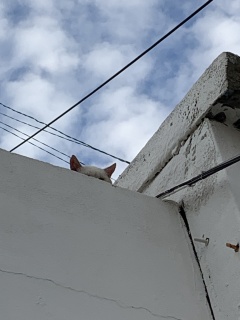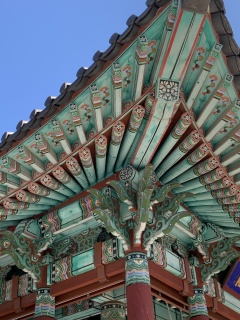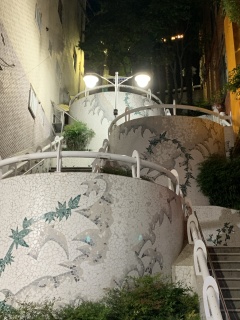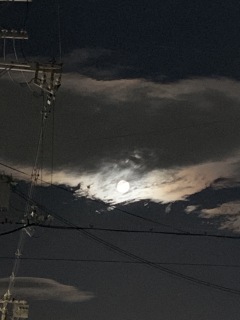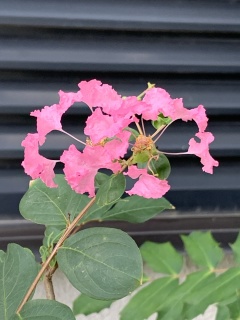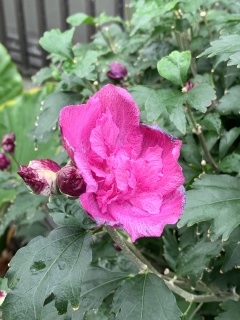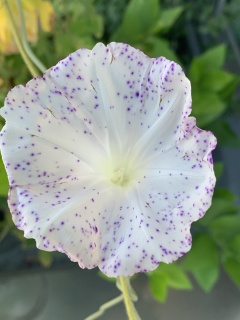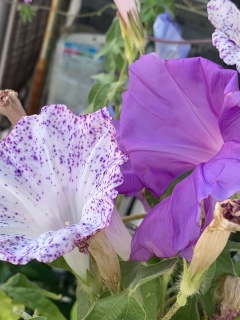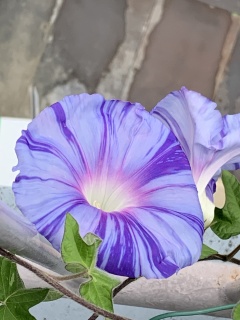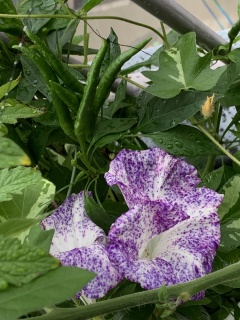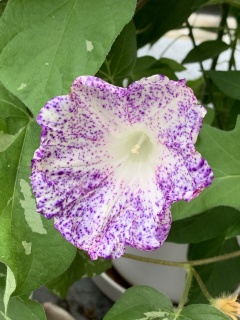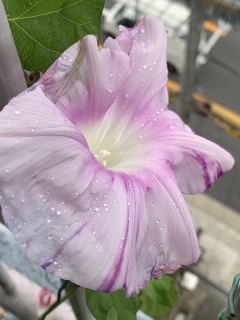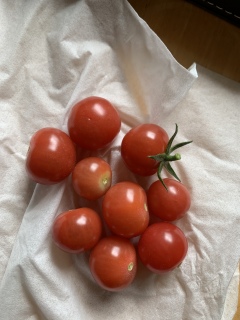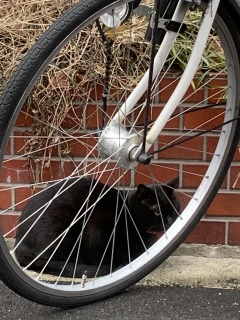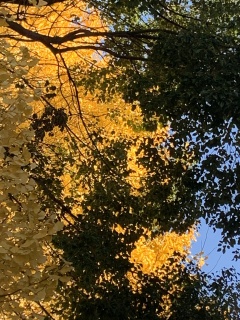So A-Pei and I were talking about chocolate chip cookies, and I had cause to ask her for the Chinese word for “pecan.” She said 胡桃, which horrified me, since in Japanese that means “walnut.” Come to find out that (I think) in Taiwan 胡桃 is pecan and 核桃 is walnut, while on the mainland 胡桃 is walnut and 山核桃 is pecan…give me strength! [Then again, as long as neither of them ends up in my chocolate chip cookies I’m okay—cookies should be warm and melty and goopy, not crunchy.]
Reading Naomi Mitchison’s short autobiography
You May Well Ask, which is all kinds of entertaining: a couple of things about her early writing that I found very relatable.
“
The Conquered, my first book, came out at white heat and, what is more, I wrote all the best bits, the juicy bits, first, the bits that were most exciting and satisfying to write, like the very end. Then I filled in the rest, but I enjoyed that too.”
“I got a great many letters about
The Conquered. This is something writers need, and a phone call isn’t the same; you can’t pick it up and look at it again years later, when you are exhausted and unhappy.”
Also, I know where I’ve heard of that book before! “She had time to…wonder what she would do if They said nothing could be done, her hand must come off, and produced block and chopper, and hacked—like Meromic in
The Conquered--with dunking in hot tar to follow.” It delights me that Nicola Marlow has read Naomi Mitchison.
[For the non-Forest readers, nobody chops Nicola’s hand off, she gets it stitched by the one character of color in the whole series, a cricket-loving Pakistani doctor, and recovers sufficiently to win a cricket match a few weeks later.]Listening, not for the first time, to an old mixtape [now a mixCD] of my father the classical musician’s favorite pop songs. “
Once upon a time I drank a little wine, was as happy as could be. Now I’m just like a cat on a hot tin roof, baby what do you think you’re doing to me,” to which my mind immediately appended “—Lan Wangji, probably.”
Also, on the Brazilian side, I don’t think I’ve posted
Se todos fossem iguais a você before—another of my very favorite Jobim songs, very singable and very loving, with the irresistible Portuguese plural of
iguais for
igual. (Link goes straight to the song, but just listen to the whole album, it’s about the best full album ever recorded in any genre).
I’ve read Diana Wynne Jones’
Charmed Life so many times I can recite good chunks of it from memory, and even so—and reading it in Chinese yet!—the climactic scene still grabs me so hard I missed my stop on the train. Comical and thrilling and quietly numinous and upsetting, all at once.
The Chinese translation is terrible, even I can tell, flat and inconsistent and inaccurate, but you take what you can get.
”And he needs us like he needs two left legs,” Bernard remarked, jerking around in the hammock as he tried to eat a jelly comes out as
“我们对他来说就像左膀右臂。“伯纳德从吊床上一跃而起,去拿冰淇淋, that is (I think)
“And according to him we’re the staff he depends on,” Bernard said, sitting up in the hammock and going to get an ice cream.” [The ice cream, at least, is a source text difference.] And that’s just one thing.
Between the “he needs us like…” and the stocks and shares and the name, it suddenly occurs to me that Bernard might be Jewish. Neat.. When Chrestomanci tells Gwendolen “Stay here and learn how to do it [use magic] properly,” it comes out as 留在这里学学怎么做人吧, stay here and learn to behave properly. I like 做人 as a phrase, though—be a mensch. Translation faults aside, I will say it cracked me up that when Cat yanks the silver handcuffs off, Chrestomanci’s “Ow!” comes out as 哎哟!.
Still rehearsing the Brahms violin concerto in orchestra—I love this piece
so much, especially but not uniquely the first movement. Last week was our first time with the solo violinist.
interpersonal grumbling
I was low-key infuriated the whole time for reasons unrelated to the music—I’m sitting inside first stand this time around, meaning that the person on my left is the first chair = leading the cello section. At this rehearsal a younger guy was asked to substitute for the usual first chair, and IN SPITE OF not being totally sure of the music he didn’t refuse when he should have done, so I spent the whole rehearsal mentally snarling that’s a tricky entrance, if you don’t come in properly with confidence no one else can either! or pizzicato on the OFF-BEAT wtf is your PROBLEM and so on, on account of if he didn’t get it right, I had to be the one responsible for doing so. Which was not ideal at the first soloist rehearsal, when it really matters to be able to follow the conductor and get it right. That aside, it was a wonderful experience anyway. The soloist (a professional violinist) was a smallish, mild-mannered, fortyish guy from Hiroshima with a big wide lush tone, very secure. Going through the concerto without stopping felt like setting off on a life-or-death adventure, exciting, knife-edge, important, heartwrenching. The best thing about rehearsing a piece for six months is that you get to know not just the parts you hear in concert or on a recording but also all kinds of little things in your own part and others—there’s a place in the violas near the end of the first movement (around 23:27 in
this recording), for instance, just a little three-note motif under the solo line that absolutely moves me to tears every time.
Zhu Yilong doing his usual thing, behaving like one of his own frequently whumped characters (I wish somebody would explain to him that putting his health at risk also means putting his career/his
work at risk, then he might listen?) and still somehow managing to
look absurdly beautiful.
Photos: The beauty salon cat having a nice outdoor bath in the sun, another cat glaring at me, geometric creepers (?), a village lane in the middle of the city, a rose, a camellia (either
tsubaki or
sazanka but I can’t tell the two apart to save my life).

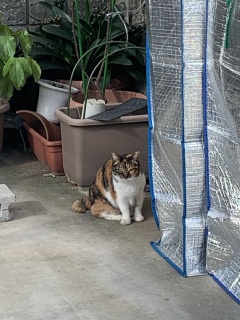
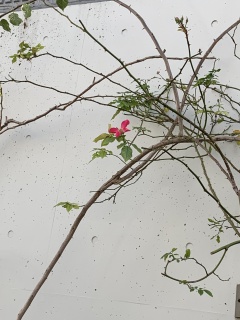
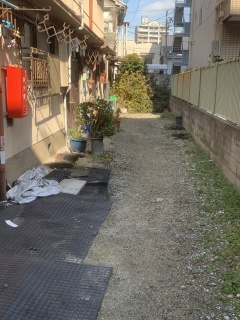

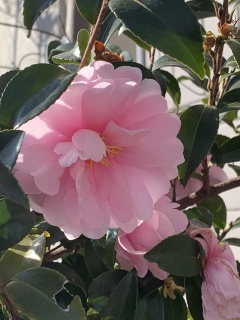
Be safe and well.








